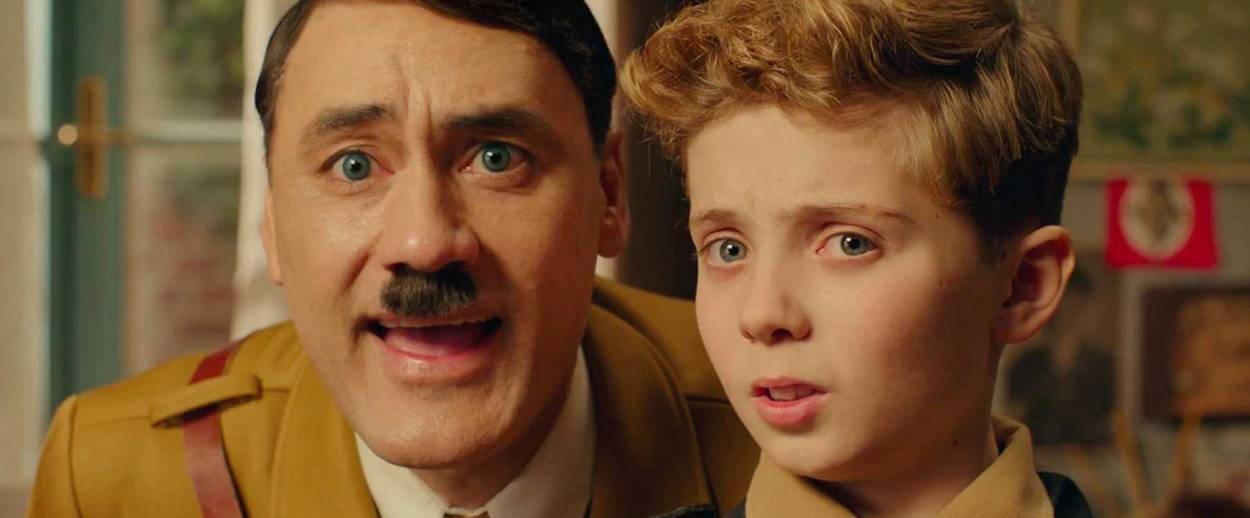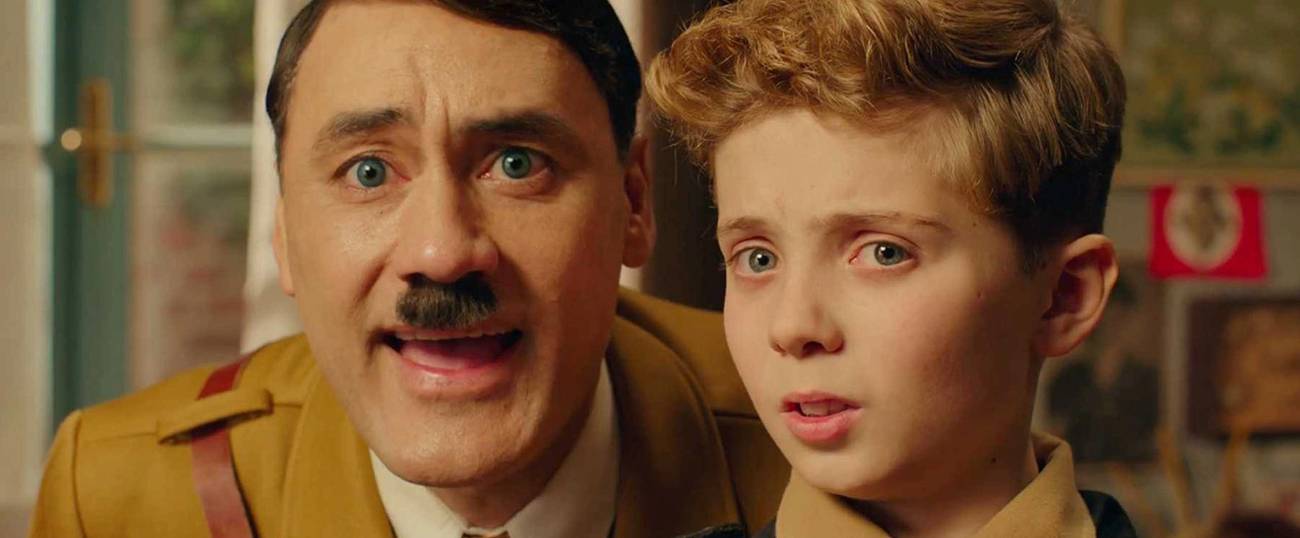Hitler’s Rabbit
Taika Waititi’s new film is a masterpiece




Jojo Rabbit, the new film by Taika Waititi, is nothing short of a masterpiece.
The director is the son of a Maori father and a Jewish mother, a native of New Zealand, and a bright star of the Marvel Cinematic Universe—he directed Thor: Ragnarok, the latest and best in a franchise otherwise burdened by a Valhalla-size sense of mirthless self-importance. With his new film, a comedy set during World War II, he joins Alain Resnais, Claude Lanzmann, and a handful of brave and brilliant filmmakers who sought complexity in the starkest of stories the 20th century had ever told. His achievement is all the more remarkable for choosing as its narrative engine the budding friendship between a young German boy and his imaginary friend, Adolf Hitler.
How to film the fuehrer? Seen through the artist’s cloudless eye, he is a ridiculous twerp, a hysterical little man perpetually animated by delusions of grandeur and sheer rage, working himself into a fit by shouting and flailing his arms. His followers are only slightly less preposterous, dressing up in tight black leather and resentment and heiling each other endlessly. All this is obviously the stuff of comedy, which is why our sharpest comic mind, Charlie Chaplin, found in Adolf inspiration for perhaps his greatest film.
But Chaplin’s The Great Dictator was released in the fall of 1940, a few months before construction began on a camp near the Polish town of Oswiecim and two years before the Nazi regime’s overlords convened in Wannsee to devise the Final Solution. After the war, filmmakers interested in Hitler had no choice but to look at him through a darker lens, which is why this ultimate villain occupies a relatively small chunk of cinematic real estate, a surprising realization given the medium’s dependence on compelling baddies. Sure, Alec Guinness nobly embodied the Nazi in the 1973 film Hitler: The Last Ten Days, but his performance comes off like a public service announcement—I, the great thespian, will now briefly break from frolicking in prestige pics like Doctor Zhivago, Lawrence of Arabia, and Passage to India in order to bring this important historical account to those of you who couldn’t be bothered reading a book—rather than a real attempt at engaging with the monster. Steven Berkoff had a little too much fun snarling his way through War and Remembrance, and Bruno Ganz delivered a turn that will forever be remembered as a meme. Anyone hoping for a Hitler of our time, then, could’ve been forgiven for giving up hope.
And then came Waititi.
Jojo Rabbit opens with the titular character, a 10-year-old German boy during World War II, trying on his Hitler Youth uniform in front of a mirror. Portrayed by Roman Griffin Davis, Jojo is scrawny and sweet. He looks nothing like the übermenschen in the Nazi propaganda posters adorning his bedroom wall, and he knows it. To feel better, he conjures the father of all imaginary friends—the fuehrer himself.
Played by Waititi, Jojo Rabbit’s Hitler is one part Michael Scott, one part Billy Madison, and one part Tinker Bell. He’s precisely the sort of joyously moronic apparition a young and anxious boy living alone with his mother—his sister having died and his father having disappeared under mysterious circumstances—would summon to help him get through the day. When older, sturdier boys challenge Jojo’s manhood, imaginary Hitler swings by happily to suggest impressing them by stealing and throwing a grenade, an escapade that ends up badly hurting Jojo and sentencing him to a prolonged and mandatory bed rest. But when the boy, stranded at home, discovers a Jewish girl hiding in his family home’s crawl space, the make-believe fuehrer is dumbfounded. “Oh,” he sneers at Jojo indignantly when the child asks him what to do about Elsa, the Anne Frank-like hideaway, “suddenly I’m the expert?”
The line is as devastating as it is hilarious, capturing both the profound inanity of the Nazi proposition—that a rock star leader with silly outfits can somehow magically reorder the world—and its harrowing effects. If Hitler is no expert about Jews, neither is Jojo, and he spends much of the first half of the movie trying to learn about the mythical creatures he was taught to despise. Elsa, played sublimely by the unimprovably un-Jewishly named Thomasin McKenzie, has her fun with the soft-hearted dolt interrogating her. “We’re just like you,” she tells Jojo, waiting a beat before adding the punchline: “only human.”
Of course, real human emotions soon eclipse foul and foolish dogmas, and as Jojo’s relationship with Elsa grows warmer his friendship with Hitler is strained. On the side of the angels are his idealistic mother—Scarlett Johansson in her best performance in years—and her friend, a weary and wise and freaky German colonel, played by the eternally entertaining Sam Rockwell. The dark side has its champions, too, such as Rebel Wilson as Fräulein Rahm, a scene-stealing twit of a true believer, and Stephen Merchant as a smiling and menacing Gestapo agent all clad in black. Each scene, no matter how small or how absurd, forces Jojo to choose—between fanaticism and compassion, between abstract ideas and real live people, between fear and hope.
In the hands of a lesser artist, this tension would have dissolved into schmaltz or, worse, into genre. Quentin Tarantino solved his Hitler problem in an orgiastic bloodbath in Inglorious Basterds, and Roberto Benigni handled it by clowning in the shadow of the crematorium in Life is Beautiful. Waititi has no patience for such shortcuts. He is committed to Rainer Maria Rilke’s dictum, presented on screen right before the credits start rolling: “Let everything happen to you/Beauty and terror/Just keep going/No feeling is final.”
Just keep going: Was there ever more salient advice? Whether you’re trying to grow up or make art or meet any of the crazy sorrow or inexplicable bliss that life unexpectedly throws your way, you could hardly ask for a better motto. The Nazis, of course, disagree. For them, life is a series of raptures and ruptures: As the Allies fight their way into town, Fräulein Rahm sends Jojo’s young friends into certain death in a sequence that is both uproarious and harrowing, and imaginary Hitler, his head now adorned with a gunshot wound that reflects his real-life counterpart’s dismal fate, grows more erratic and terrifying by the moment. As he does, Jojo, and we with him, realizes that the dead leader is best understood as metaphor, instructive and intoxicating but entirely possible to resist.
Because the year is 2019, and because we are once again awash by a torrent of unreason, Jojo Rabbit is being released with its bouquet of trigger warnings, labeled explicitly as an “anti-hate satire” lest someone on the internet claim that it’s meant as a love song to Hitler. No such disclaimers are necessary. Waititi has given us the rare contemporary movie that rewards rewatching: Go once and savor all the funny moments, and then again to take in all the heartbreaking ones. Both are an essential part of life, even, or especially, when it’s very dark outside. No feeling is final.
***
Like this article? Sign up for our Daily Digest to get Tablet magazine’s new content in your inbox each morning.
Liel Leibovitz is editor-at-large for Tablet Magazine and a host of its weekly culture podcast Unorthodox and daily Talmud podcast Take One. He is the editor of Zionism: The Tablet Guide.